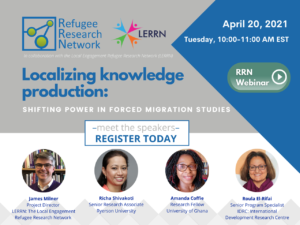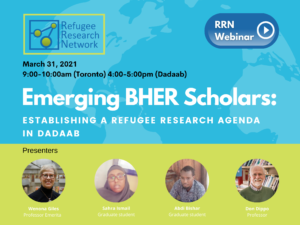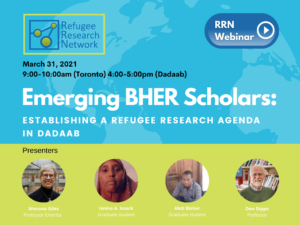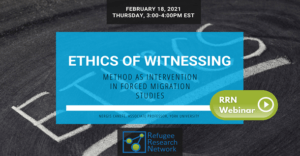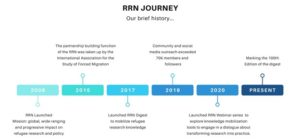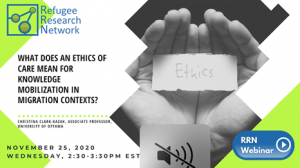The RRN Research Digest provides a synopsis of recent research on refugee and forced migration issues from entities associated with the RRN and others.
You can download the digest in PDF format here: RRN Research Digest No. 106
Recent Publications and New Research
Tosh, S.R., Berg, U.D., & León, K.S. (2021). Migrant Detention and COVID-19: Pandemic Responses in Four New Jersey Detention Centers. Journal on Migration and Human Security. This article examines the relationship between COVID-19 and processes of migrant detention and deportation through a case study of New Jersey — an early epicenter of the pandemic and part of the broader New York City metro area. Drawing on publicly available reports and in-depth interviews with wardens, immigration lawyers, advocates, and former detainees, the authors describe the initial COVID-19 response in four detention facilities in New Jersey. The findings suggest that migrant detention and deportation present distinct challenges that undermine attempts to contain the spread of COVID-19.
Bottomley, B. (2021) NGO strategies for sex and gender-based violence protection and accountability in long-term displacement settings: Reviewing women’s participation in humanitarian programmes in Dadaab refugee complex [Working paper]. This article addresses the intersection between non-governmental organization (NGO) protection strategies for sex and gender-based violence in long-term displacement settings and recent discourse on humanitarian accountability practice. The author concludes that NGOs must adopt a more comprehensive system of gender mainstreaming across the humanitarian sector, to ensure that participatory approaches to protection from sex and gender-based violence in long-term displacement settings prioritise gender equality as a substantive objective.
Masterson, D., & Yasenov, V. (2019). Does halting refugee resettlement reduce crime? Evidence from the United States refugee ban. American Political Science Review, 1-8. Many countries have reduced refugee admissions in recent years, in part due to fears that refugees and asylum seekers increase crime rates and pose a national security risk. Existing research presents ambiguous expectations about the consequences of refugee resettlement on crime. The authors leverage a natural experiment in the United States, where an Executive Order by the president in January 2017 halted refugee resettlement. This policy change was sudden and significant—it resulted in the lowest number of refugees resettled on US soil since 1977 and a 66% drop in resettlement from 2016 to 2017. The findings suggest that there is no discernible effect on the county-level property or violent crime rates.
Schammann, H., Gluns, D., Heimann, C., et. al. (2021). Defining and transforming local migration policies: A conceptual approach backed by evidence from Germany. Journal of Ethnic and Migration Studies. This article explores the factors that drive municipalities to become active in the field of migration and migration-related diversity. Based on qualitative data from 126 German municipalities, this article proposes a new conceptual framework that allows for larger-scale comparisons and enables theory building on policy (in)activity at the local level. The authors discuss various theoretical approaches and empirical findings from the literature by using a heuristic of four categories of factors: institutional framework (e.g. competencies, discretionary spaces, multilevel governance), structural conditions (e.g. urbanity/rurality, socioeconomic conditions); local discourses (i.e. narratives creating a local space of possibilities), and local key actors (e.g. mayors, street-level bureaucrats).
Reports, Policy Briefs and Blogposts
Supporting Canada’s COVID-19 Resilience and Recovery Through Robust Immigration Policy and Programs by Victoria Esses, An RSC Policy Briefing, March 2021. This report provides recommendations for action by the federal and provincial/territorial governments designed to optimize immigration to Canada. Broadly, these include a public education program on immigration, expanded pathways to permanence for temporary residents, targeted policies and programs that address the needs of vulnerable permanent and temporary resident groups and special consideration of Francophone immigration.
The Humanitarian Effects of the COVID-19 Pandemic for Venezuelans in Peru, One Year In by Rachel Schmidtke & Anatali Oquendo Lorduy. Refugees International, April 2021. This report bears witness to the lives and challenges of Venezuelans in Peru, surviving displacement and the pandemic. The authors recommend concrete steps to alleviate the obstacles facing Venezuelans in Peru. Specifically, for the Government of Peru to expand legal residency for Venezuelans; for Peruvian civil society to increase their own outreach and collaboration with Venezuelan-led groups; and the Peruvian government and international donors to commit to vaccinating Venezuelans alongside Peruvians.
The Human Rights Situation of Uyghurs in Xinjiang, China, Report of the Standing Committee on Foreign Affairs and International Development. House of Common – Canada, March 2021. This report is divided into three chapters. Chapter one provides a historical overview of the Uyghurs, including their presence in Xinjiang (formerly known as East Turkestan), the Government of the PRC’s evolving approach to the region, and the link with its increasingly violent efforts to repress Uyghurs and other Turkic Muslims. Chapter two outlines the different ways in which the Government of the PRC is repressing Uyghurs and other Turkic Muslims in Xinjiang. Finally, Chapter three outlines why the Subcommittee is confident that the treatment of Uyghurs and other Turkic Muslims in Xinjiang meets the definition of genocide under the Genocide Convention. It also considers Canada’s international obligations under the convention and addresses crimes against humanity in Xinjiang.
Accountability to Affected Populations in Displacement Contexts and During the Covid-19 Pandemic by Diana Martin. Refugee Law Initiative (School of Advanced Study, University of London) in collaboration with the International Rescue Committee, London, 2021. During the pandemic, the RLI has undertaken a real-time evaluation of the impact of Covid-19 on IRC Uganda’s humanitarian response and accountability to affected populations. While the report focuses on IRC Uganda’s application of Client Responsiveness during the Covid-19 pandemic, key findings and lessons are relevant and applicable to other IRC country programs, as well as other humanitarian organizations. The report shows how humanitarian organizations can be accountable to the communities they serve even during a pandemic when engagement between humanitarian staff and affected populations is heavily restricted due to lockdown regulations.
Gruber, M. & Zupan, K. (Eds.) (2021): Report on existing integration-political goals, programs and strategies in the European Union and the MATILDE countries and rural regions.This reportpresents an overview of existing integration-political goals, programs and strategies at different governance levels: the European Union level, the national level represented by the ten MATILDE countries – Austria, Bulgaria, Finland, Germany, Italy, Norway, Spain, Sweden, Turkey and the United Kingdom, the regional level analyses based on the MATILDE rural case study regions, as well as the local level of these ten countries. Hence, this report aims to analyze the desired goals and guiding principles in the governance of migration and integration politics. The chapters include historical highlights since the 1990s impacting the further development of integration political goals and strategies.
It’s Time to Recognize Climate Refugees by Keith Lema. International Policy Digest, April 6, 2021. Through a flurry of executive action and appointments in his first 100 days, President Biden is restoring U.S. leadership on both climate change and refugee resettlement. Addressing climate change today will save lives, property, and money in the long run. Accepting more refugees will enhance America’s moral leadership while reinvigorating American communities with new, hardworking members. The author argues that President Biden should go further: He should recognize that climate change drives the need for refugee resettlement.
Digital and Social Media
RRN webinar recording: Emerging BHER Scholars: Establishing a Refugee Research Agenda in Dadaab. March 31, 2021. The speakers in this webinar addressed the importance of ongoing research in and on Dadaab. The overarching theme was the barriers to inclusivity in education in the Dadaab refugee camp, and was addressed by Dadaab scholars with specific reference to their research in progress.

